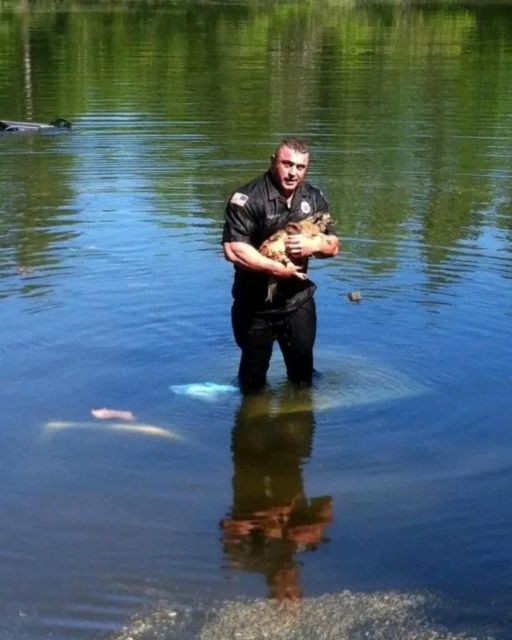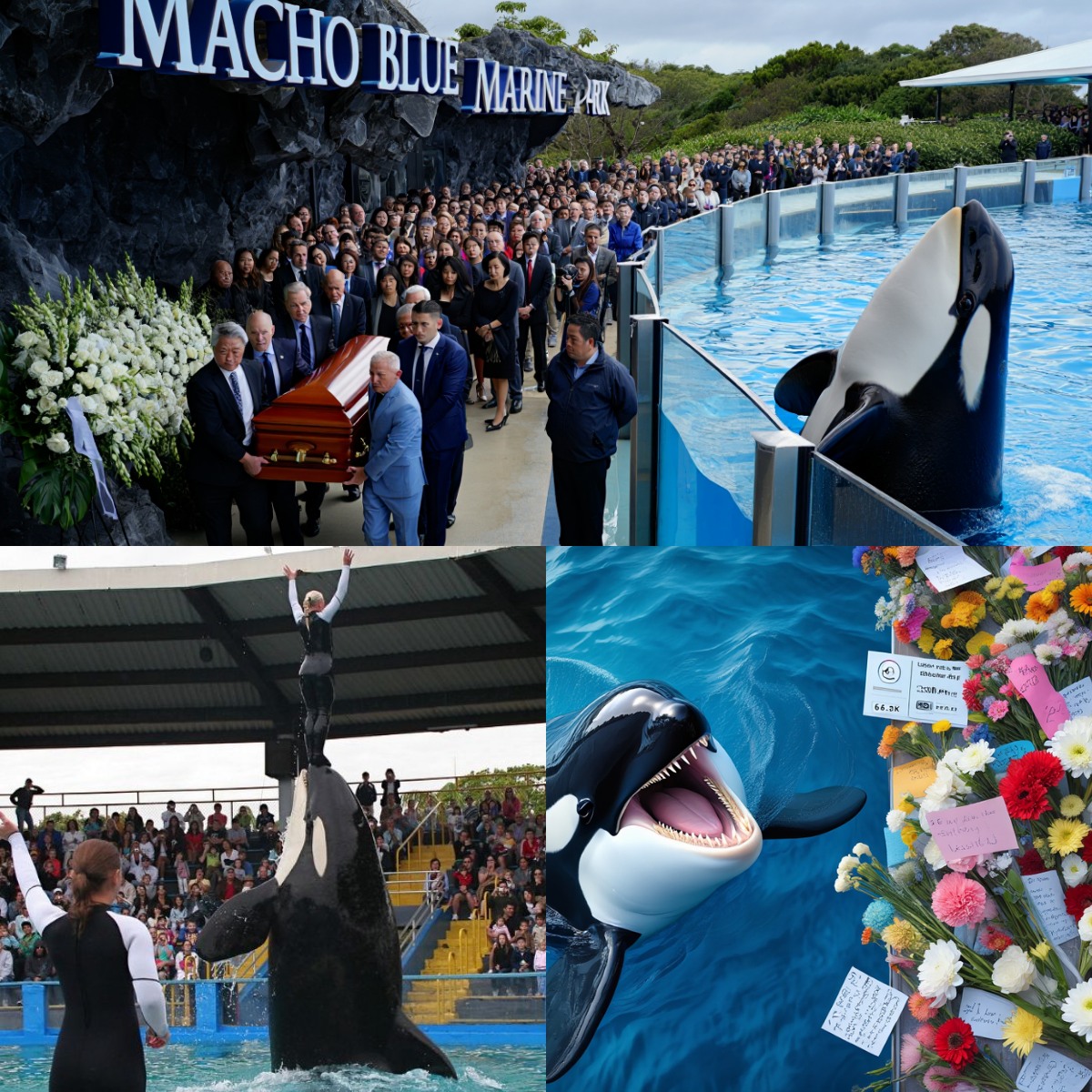When a woman’s SUV veered into deep water, she managed to escape with one of her dogs. But her other pup remained trapped inside the submerged vehicle. That’s when Officer Daniel Harris arrived. Without hesitation, he jumped in — full uniform, icy water, zero visibility — and dove to the bottom. Wrestling stuck doors and racing against time, he wouldn’t give up. Seconds later, he emerged — breathless, drenched, but holding the dog safely in his arms. No spotlight. No pause. Just sheer courage.
The woman — her name was Marissa — stood shaking on the bank as Daniel gently handed her the trembling golden retriever. Tears streamed down her cheeks, mixing with the lake water on her face. She kept whispering, “I thought I lost him. I really thought he was gone.” Daniel gave a quiet nod, catching his breath. “Are you alright?” he asked.
The small crowd that had gathered didn’t say anything at first. But it wasn’t an awkward silence — it was the kind that happens when people witness something deeply human. A kind of reverence. Someone passed Daniel a blanket, which he draped over his shoulders, water still dripping from his boots.
Marissa’s vehicle was gone, claimed by the murky lake. But she and both her dogs were alive, thanks to someone who didn’t hesitate. She kept looking at Daniel, as if wanting to say more, but unable to find the words.
Back at the station, Daniel filed his report: water temperature, visibility, basic details. Then he moved on to the next call. To him, it was simply part of the job. But word had already begun to spread. By evening, a local news team was waiting outside the precinct, hoping for an interview. Daniel slipped out the back — he had no interest in being turned into a headline for doing what he believed anyone in his shoes would’ve done.
Still, the town noticed. Locals brought coffee to the station. Someone left dog treats on Daniel’s desk with a note: “For the other hero.” Even the mayor stopped by to shake his hand. Daniel accepted it all humbly, repeating the same phrase: “What matters is they’re okay.”
Marissa couldn’t move on so easily. Three days later, she returned to the station with both dogs—Max and Sunny—at her side. She said she had something for him. From her bag, she pulled out a small wooden box. Inside was a slightly tarnished silver medal.
“This belonged to my dad,” she said quietly. “He was a firefighter. Got it after rescuing a family from a house fire. He passed away last year. I didn’t know what to do with it… until now. After what you did, I think he’d want you to have it.”
Daniel tried to decline. “It should stay in your family,” he said.
But Marissa shook her head. “He always told me—real heroes don’t wait for perfect moments. They step up. Just like you did.”
Reluctantly, Daniel accepted it. He kept it in a drawer at work. He never wore it, but now and then, he’d open the drawer, glance at it, then close it again.
Weeks went by. Winter crept in. The lake began to freeze over, and the story faded from conversation. Daniel went back to his usual rounds — traffic calls, neighborhood squabbles, missing pets. Until, one snowy afternoon, a call came in.
“Structure fire reported. Rural property. Unknown if anyone inside.”
The road was slick with ice, and by the time Daniel arrived, smoke already poured from the house. A woman outside screamed that her son was still upstairs.
No time to wait. Daniel ran inside. The smoke stung his eyes; the heat was suffocating. Guided by the woman’s panicked gestures, he found the stairs and pushed through the thick haze. In the bedroom, a boy—maybe eight—was hiding under a bed, clinging to a terrified beagle. Flames crept down the hallway.
Daniel gathered both — child in one arm, dog in the other — and carefully made his way out, every step slower as the fire grew hotter. He made it out just as the roof began to collapse. The mother collapsed around her son, and the dog bolted into her lap.
Then he saw her — Marissa — standing across the street. She lived two doors down and had run over when she saw the smoke. Their eyes met, and recognition sparked.
Later, after the fire crews arrived and things settled, she walked up to Daniel. “You don’t realize how rare this is,” she said softly. “To be in the right place. Twice. And both times, you acted.”
Daniel said nothing at first. But something shifted inside him. He thought about the medal. About her father. About what it means to show up — again and again — even when it’s hard.
A few days later, Marissa called. She had an idea: a fundraiser for local first responders, both human and animal. “Because it’s not just about people,” she said. “That day at the lake proved that.”
Daniel was hesitant to be involved in anything public. But Marissa promised — it wouldn’t be about him. It would be about getting more people trained and equipped to help. He agreed, on one condition: his name wouldn’t be the focus.
They planned it for early spring, at the park near the lake. They called it Hero Day. The turnout was larger than anyone expected. Firefighters held demos, paramedics taught kids basic first aid, and a rescue group brought adoptable dogs.
Marissa gave a brief speech. She shared both rescue stories — without naming Daniel — and ended with this: “Heroes aren’t rare because they’re different. They’re rare because most people freeze when the moment comes. But we can change that.”
The event raised enough money to buy water rescue gear for the fire department and to launch pet first-aid classes. Daniel stood quietly off to the side, watching, feeling something unfamiliar — a kind of peace. A quiet pride.
Then came a twist.
About a month after Hero Day, Daniel got a call from a nearby police department. They’d heard about the rescues and the fundraiser. They had a position open — a role focused on rescue operations, both on land and in the water. Better equipment. Specialized training. A chance to do more of the work he clearly had a gift for.
It wasn’t an easy choice. He loved his town. But after some thought, and conversations with family, he knew — this was the right move. He took the job.
On his last day, clearing out his desk, he found the medal again. For a moment, he considered packing it. Instead, he walked over to Marissa’s home. When she answered, he handed it to her.
“It was your dad’s,” he said. “It should stay with you. But I want you to know… it’s why I said yes to this new role. You helped me see it’s not about one rescue. It’s about showing up, again and again, for whoever needs it.”
Her eyes welled up, but she smiled. “Then it’s already done its job.”
Months later, Daniel found himself wading into fast-moving spring water to reach a kayaker caught in the current. The rescue was intense. Exhausting. But when he finally pulled the man to safety, the kayaker gripped his arm and said, “You came out of nowhere. I didn’t think anyone would risk it.”
Daniel just nodded, remembering the words Marissa’s father had lived by: Real heroes don’t wait for the perfect moment.
Looking back, none of it — the medal, the fundraiser, the new role — would’ve happened if he hadn’t trusted his instinct that icy day by the lake. And maybe that’s the real lesson: you never know which moment will define your path — or someone else’s.
You just have to be ready to jump, even when the water is cold and the outcome uncertain.
Because sometimes, the real reward isn’t applause — it’s knowing you showed up when it counted most.


